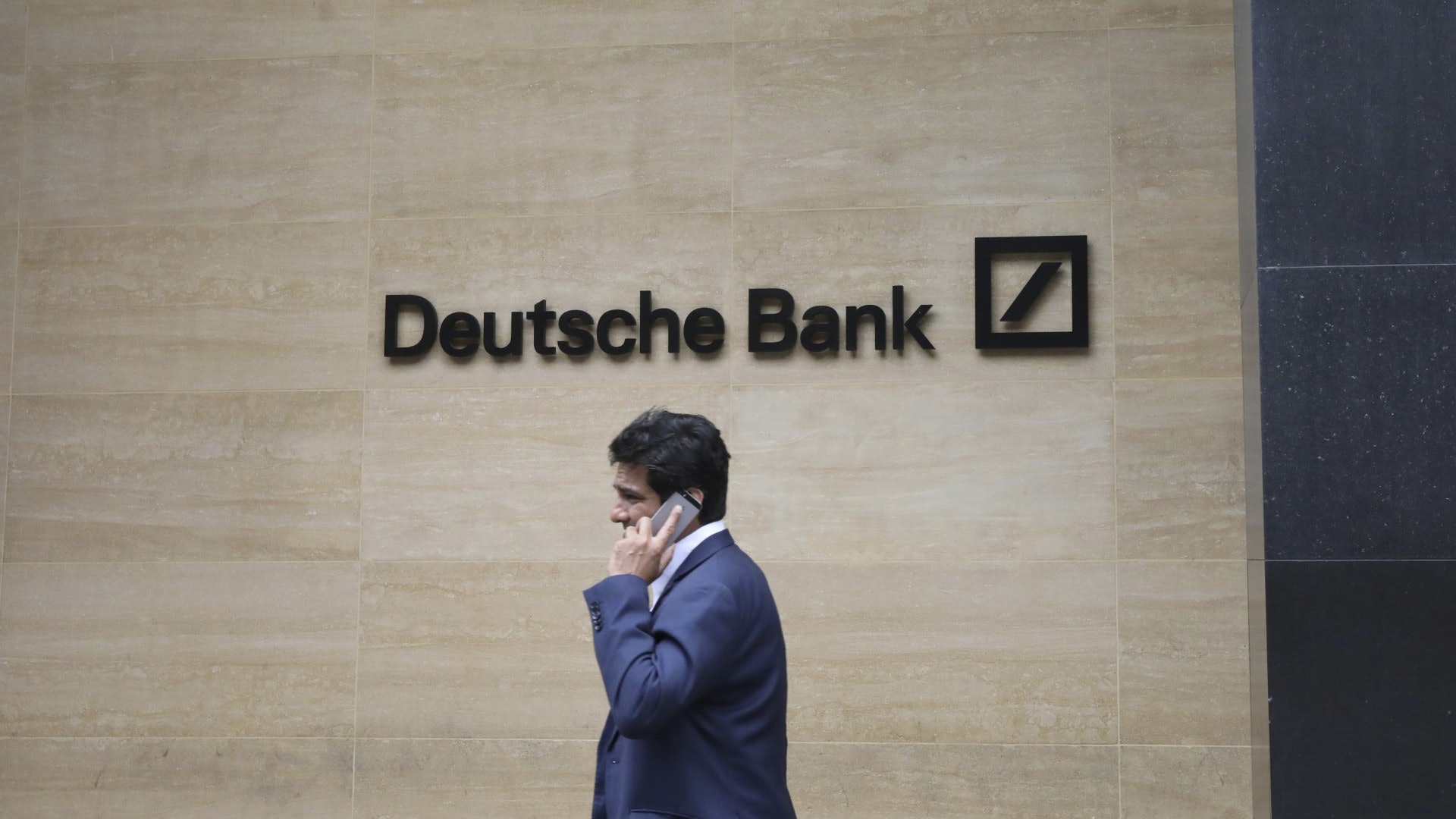Deutsche Bank, which has a history of nearly 150 years, dropped a shocking bomb last Sunday (7th). Chief Executive Christian Sewing announced on Sunday that he will carry out a major restructuring plan, which will lay off 18,000 people worldwide and withdraw from the risky investment banking business. It also means to become a world-class investment bank and return to the most Stabilizing the traditional mainstream business.
German companies always give people the impression of stability, high quality and strict compliance. Behind the powerful national economy, why is the banking industry such a mess?
Germany is Europe’s largest economy and Deutsche Bank is Germany’s largest private bank. However, in the past ten years, Deutsche Bank has not recovered from the financial tsunami. Even if it has been changed, it has not turned a profit, and it has fallen into a lot of business violations and money laundering scandals. Deutsche Bank currently employs 92,000 people worldwide. According to current plans, the number of employees in 2022 will be reduced to 74,000.
Bank empire
Deutsche Bank will reorganize its business direction, and the first to bear the brunt will be investment business, including closing the loss of stock trading business and reducing bond and other interest rate trading business. Garth Ritchie, director of investment business, has resigned last Friday. This also shows that Deutsche Bank has been among the top investment banks in Wall Street for the past 30 years. It is already a strong end, giving up Goldman Sachs’ competitor in Europe and refocusing on traditional business, including for Germany and Europe. Corporate customers provide financing.
In fact, Deutsche Bank, which was founded in Berlin in 1870, was one of the few AAA-rated banks in the world in the 1980s because it adopted a conservative business strategy after World War II. By 1989, Deutsche Bank was preparing to expand its global business and acquire the UK investment bank Morgan Grenfell, which is among the world’s major investment banks. In order to compete with Wall Street, such as Goldman Sachs, it first entered the world financial hinterland of New York in 1994, and then invested $10.2 billion (about 79.5 billion Hong Kong dollars) in 1999 to merge into New York’s Bankers Trust.
Before the 2008 financial tsunami, performance has been strong, at the peak of 2007, the stock reached 102 euros, and now fell to about 7 euros. One of the main reasons for the financial crisis is that the US banking industry has committed too many high-risk projects, and the profit is the global storm caused by the random lending. After the incident, the US Department of Justice made huge fines for large and small banks, including $16.7 billion from Bank of America, $5.1 billion from Goldman Sachs, $13 billion from JP Morgan Chase, $2.6 billion from Morgan Stanley, and $7 billion from Citigroup. Dollars, etc. When the US Department of Justice found Deutsche Bank, it also found that many speculative financial projects were also part of Deutsche Bank’s participation, “doing evil” as much as the above-mentioned financial giants.
In the years before the financial tsunami, Deutsche Bank was the leader of mortgage-backed securities (MBS). At the time, Deutsche Bank actually repackaged poor-quality mortgages into financial products for sale to investors. In 2008, the bank’s financial report showed a loss of 3.9 billion euros, which was the first time that Deutsche Bank recorded a loss in the past 50 years. Deutsche Bank and later admitted that in the sale of MBS, did not honestly inform investors that MBS is at risk, suspected of misleading investors, and finally reached an agreement with the US Department of Justice at the end of 2016 to pay $7.2 billion (approximately HK$56.1 billion) in settlement payments.
Ambition expansion, heavy penalty, dry pond
Josef Ackermann, CEO of Deutsche Bank, said, “We made mistakes, just as everyone made a mistake.” He resigned as CEO in May 2012, and succeeded co-CEOs Anshu Jain and Jurgen Fitschen, also in the Libor Scandal. After the explosion, both of them left the company. The incident involved a number of Deutsche Bank employees. They were suspected of illegally controlling the interbank lending rate (Libor) between London and China during 2014-2015, which greatly increased the value of Deutsche Bank, and they were apparently in the financial tsunami. Spend peacefully. The incident was also seen as the cause of the Deutsche Bank storm. Deutsche Bank was fined $2.5 billion (approximately HK$19.5 billion) in April 2015, the biggest fine in the entire Libor scandal.
Later, Deutsche Bank was fined $258 million (more than HK$2 billion) by the US government for dealing with countries on the US sanctions list. In 2017, Deutsche Bank was fined $630 million (over HK$4.9 billion) by the United Kingdom and the United States for failing to block Russia’s $10 billion in black money through mirror trades. Last year, New York financial supervision fined 205 million US dollars (nearly 1.6 billion Hong Kong dollars) to Deutsche Bank, accusing Deutsche Bank of being too lenient in foreign exchange regulation between 2007 and 2013, when Deutsche Bank was the world’s largest foreign exchange dealer.
The merger plan is unhelpful
Until 2015, Deutsche Bank’s financial business ranked third in the world, but poor management, as well as numerous improper trading practices, suffered heavy penalties from the international community, and naturally reinvented the bank’s reputation, and the stock price was sluggish. British banker John Cryan became the president of the German bank from July 2015 to April 2018. During his three-year tenure, Deutsche Bank’s share price fell more than half, which has undoubtedly laid the groundwork for today’s earthquake.
In order to save the German banking industry, since 2016, Deutsche Bank has negotiated with the German commercial bank (Commerzbank). If successful, it will become the third largest bank in Europe after HSBC and BNP Paribas. However, the negotiations also broke down in April this year. Although the German government advocated a merger plan, both banks considered that the cost and risk were too great. After considering many “salvation schemes”, Deutsche Bank finally finalized this major restructuring plan and cut it down. 20% of the world’s employees.
How did the German culture that adheres to the regulations disappear?
Germany has always had a traditional and rigorous national culture. German companies have always given the impression of being practical and credible. Why is the century-old number of Deutsche Bank falling like a field? Looking back at the acquisition of London Morgan Griffith in 1989, it is the first step for Deutsche Bank to transform itself from a commercial bank to an investment bank.
Professor of the Department of Finance and Finance, Taiwan Practicing University, and Independent Director of Citibank (Taiwan) Shen Zhonghua wrote the article. It is said that when Deutsche Bank wants to enter the international financial market, it must first introduce the British financial culture that Germany lacks. However, the entry of Deutsche Bank into the UK financial market is not smooth in the first year. It is another financial culture, that is, financial speculation culture. “Morgan’s adventurous trading is not incompatible with the traditional German culture of strict and law-abiding, and cannot be accepted by the German headquarters. Even many German bankers cannot understand the financial language of British bankers.”
After more than a decade of hard work, Deutsche Bank has been transformed from a German-based commercial bank into a world-class financial giant. In 2015, it was the world’s third largest investment bank and the world’s largest foreign exchange trading bank.
However, opportunism or itself is different from the national character of Germany.
Shen Zhonghua pointed out that banks have made money and their risks have increased. More importantly, corporate culture has undergone profound changes. “Deutsche Bank Small is Big, seemed successful, but if you encounter storm, such as legal disputes and fines, the bank will be Liudongzijin dilemma.” He also mentioned that, if the * capital adequacy ratio standard, Deutsche Bank The capital is sufficient, but with the * leverage ratio as the standard, Deutsche Bank’s capital is not enough.
*Bank of International Settlement ratio (BIS ratio): The ratio of the bank’s own net capital divided by its total risk assets. The country’s own standards are to regulate the excessive risk assets of financial institutions. To ensure the safety and financial stability of the bank’s operations.
* Leverage Ratio: Calculates the solvency of a company by dividing its bank liabilities by Shareholders Equity. The formula is (short-term borrowing + long-term borrowing – cash and deposits) in shareholders’ equity.
Its high capital adequacy rate misleads the public as a safe bank. In fact, it is a highly leveraged bank, which is a bank that undertakes high-risk projects, so the US financial community says it is “the most dangerous in the world.” “The greed makes it no longer a traditional German culture in which we know rigorous and law-abiding.”












